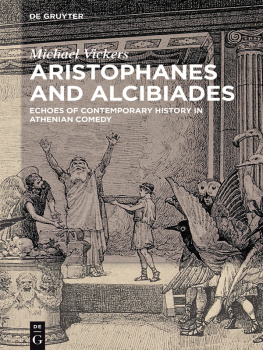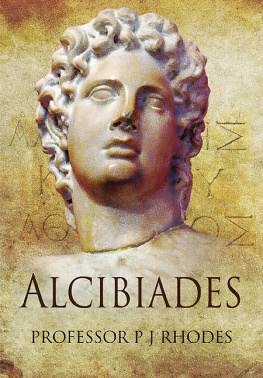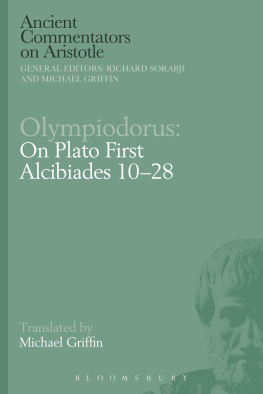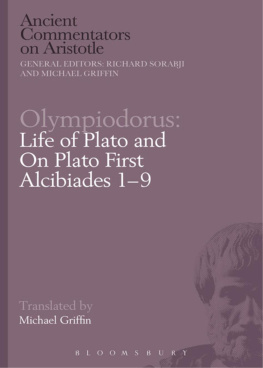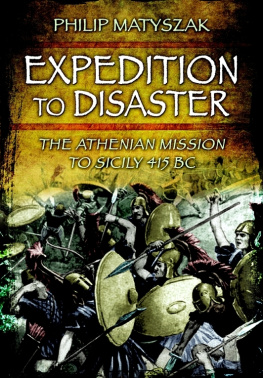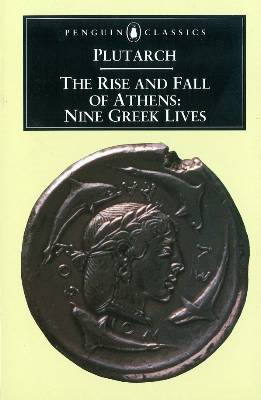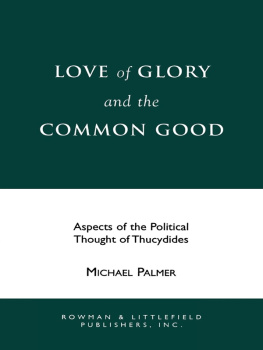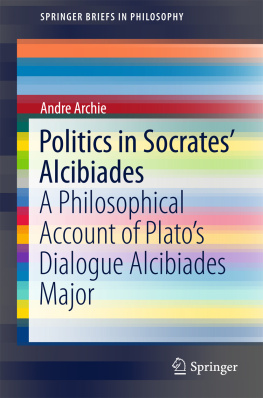Table of contents
- Chapter 1
Political Allegory in Aristophanes - Chapter 2
Wordplay; Pericles, Alcibiades and Aspasia on Stage - Chapter 3
Pericles (and Alcibiades) on Stage: The Story So Far - Chapter 4
The Tragic Context: the Case of Euripides Ion - Chapter 5
Happy Families: Plutus i - Chapter 6
Home Economics: Plutus ii - Chapter 7
The Woman of Old: Euripides Helen and Andromeda - Chapter 8
Alcibiades is a Womans Man: Lysistrata - Chapter 9
Alcibiades in Gaol: Thesmophoriazusae - Chapter 10
Frogs: Nothing to Do With Literature - Chapter 11
Aspasia on Stage: Ecclesiazusae - Appendix 1
Alcibiades Servile Birth, Alcibiades Matrophilia: Inventions of the Stage? - Appendix 2
The Athenian Plague of 430428 BC - Appendix 3
Keith Sidwells Aristophanes the Democrat
Michael Vickers
Aristophanes and Alcibiades

In memory of my teachers
A.D. Fitton Brown, R.E. Wycherley
and W. H. Plommer
ISBN 978-3-11-043753-9
e-ISBN (PDF) 978-3-11-042791-2
e-ISBN (EPUB) 978-3-11-042795-0
Library of Congress Cataloging-in-Publication Data
A CIP catalog record for this book has been applied for at the Library of Congress.
Bibliographic information published by the Deutsche Nationalbibliothek
The Deutsche Nationalbibliothek lists this publication in the Deutsche Nationalbibliografie; detailed bibliographic data are available on the Internet at http://dnb.dnb.de .
2015 Walter de Gruyter, Inc., Berlin/Boston
www.degruyter.com
Preface
This book is a continuation of my Pericles on Stage: Political Comedy in Aristophanes Early Plays (Austin, Texas, 1997; reprint 2012). The first six of Aristophanes extant plays were discussed there: Acharnians (425 BC), Knights (424 BC), Clouds (423 BC), Wasps (422 BC), Peace (421 BC), and Birds (414 BC), and a case was made that the principal targets for Aristophanes humour were the long-dead Pericles, Cleon, and Pericles foster-son Alcibiades. Caricatures of these individuals served as the hooks upon which were hung old-fashioned values, belligerent politics, and new-fangled excesses. It was argued that Aristophanes wrote in an allegorical manner, and used the public images of prominent citizens in order to divert his audiences with a view to winning the prize at dramatic festivals.
There seemed to be sufficient overlap between Aristophanes characters and plots and what we know from a range of sources about Pericles and Alcibiades in particular to justify such equations. If this were indeed the case, it would not be surprising to find both historical individuals underlying characters in Aristophanes five remaining extant plays: in Lysistrata (411 BC), Thesmophoriazusae (410 BC), Frogs (405 BC), Ecclesiazusae (391 BC), and Plutus (388 BC); indeed, the very fact that this exercise can be done at all should serve to confirm the essential validity of the initial approach. One of the purposes of this book is to draw out these further possibilities; not all of them (for that would be unduly repetitious), but enough to show how Aristophanes went about the task of amusing and at times edifyinghis Athenian audience.
The argument presented here makes certain demands on the reader, who is in the first place required to accept the possibility that all may not be rosy in the garden of classical philology. Those who believe that the story of Altertumswis-senschaft has been one of continuous progress since it began in the early nineteenth century are in for a shock, but this is not my concern. Those who by contrast are willing to consider the possibility that there may be other ways of looking at our textsways that may perhaps be more in keeping with those of the ancientsare in for a diverting read.
What I believe I have discovered is a means of understanding Greek plays not simply in terms of contemporary history, but as personalised in the way that Greek politics were frequently based on the reputations, ambitions and achievements of individuals. It was thus for Aristotle: history was personal and dealt in particulars. The example he chose is what Alcibiades actually did, or what was done to him ( Po. 1451 b .11). Drama, for Aristotle, describes the kind of things that a person of a certain character would inevitably say or do given their known proclivities and predilections ( Po. 1451 b .8 9). Again, the reference appears to place matters on a personal level.
Alcibiades figures large in this book because his personality dominated Athenian gossip from the early 430s BC, when he was a trend-setting teenager, to well beyond his death in 404. And not simply gossip, though that was paramount (and of direct concern to a theatre that played with mensand womens reputations), but Alcibiades constantly played on his wealth and connections, whether acquiescing in the presentation to him of the ptoTov (prize for valour) at Potidaea in 431 BC, which should more properly have gone to Socrates; or precociously obtaining a profitable place on the board of commissioners who re-assessed the Athenian tribute in 425 BC; or obtaining a generalship at a very early age for that office in 420 BC. This is by way of meeting a point raised by critics of Pericles on Stage that since Alcibiades was not a crucial figure or was not yet prominent in the period 42521 BC, it is unreasonable to think of him as underlying several characters in Aristophanes early plays. Alcibiades further notoriety as a pathic, a thief, a murderer, a traitor, a matrophile, a profaner of the Mysteries, a liar and an adulterer would only have served to embroider the gossip, and have provided writers for the stage with additional material. Thanks to Alcibiades, the Athenian citizenry would have had a constant diet of the juciest imaginable public and private scandal over more than thirty years.
I have argued elsewhere that Sophocles was on to Alcibiades case from the early 430s BC, when he used Alcibiades ambivalent sexuality and teenage cross-dressing (of which he boasted), not to mention his disturbed personality, for the characterisation of Antigone, in a play that probably served in the first instance as a vehicle for criticism of Pericles having left executed prisoners unburied after his Samian triumphs in 439; and that Sophocles had in mind the threat to the Athenian polity presented by Alcibiades excesses in Oedipus Tyrannus of 425 BC when he extrapolated from rumours that he had had an affair with his guardians mistress Aspasia (elaborated by Aristophanes, and by Euripides in his Hippolytus plays: Appendix 1, below). Contemporary gossip had it that Alcibiades had not only slept with his mother, but with his sister and his daughter, and there are many parallels between Oedipus road rage when the "narrow way" was blocked by Laius carriage, and the intransigence of the infant Alcibiades before a cart in a narrow street in Athens. Oedipuss irrational belligerence is matched by Alcibiades tendency to fly off the handle, sometimes with fatal results. Other Sophoclean characters that are based in one way or another on Alcibiades include Ajax, Philoctetes, and the Oedipus at Colonus who is initiated into the Mysteries, just as Alcibiades had been shortly before Sophocles composed his last extant play.
It will be argued here that Alcibiades some-time effeminacy, his dissolute and irreligious life-style, and the constant fears that he was aiming at tyranny underlie most of Aristophanes extant comedies. I am fully aware that few Ar-istophanic specialists are likely to be persuaded (to quote one reviewer of Pericles on Stage ), for they have their own way of going about things. For example, they consistently ignore ancient testimony for Alcibiades paramount role in comedy. The learned Libanius states explicitly: What play did not include [Alcibiades] among the cast of characters? Eupolis, Aristophanes, did they not show him on the stage? It is to him that comedy owed its success (Lib. fr. 50.2.21), and for Plutarch, Alcibiades was a powerful speaker, as the comic dramatists bear witness (Plut. Alc . 10.4). Aristophanic specialists, however, ignore this evidence and are at one in scratching their heads over the apparent paucity of references to Alcibiades. Notable too in our surviving fragments is the almost complete dearth of attacks by comic poets on one of the most controversial figures of the day: the flamboyant aristocrat Alcibiades is a typical recent statement of this position.

